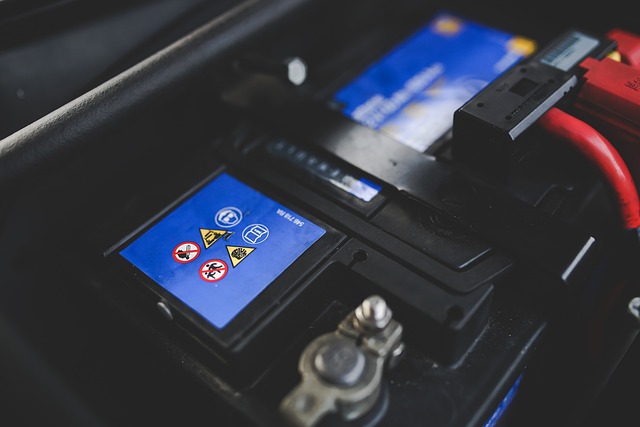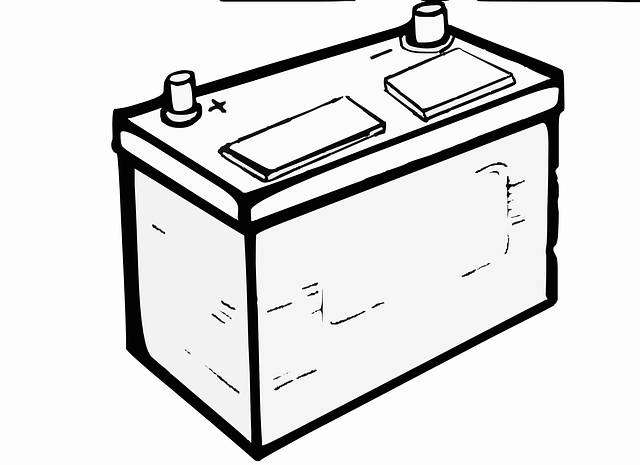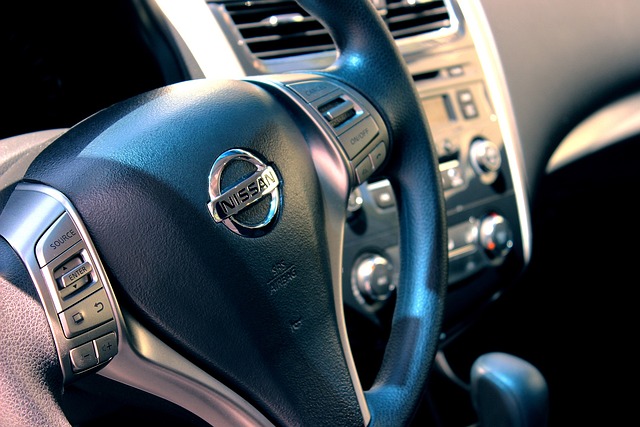When replacing a car battery, it's essential to dispose of the old one responsibly due to its hazardous contents like lead and sulfuric acid. Proper disposal through specialized collection centers or facilities is necessary to prevent environmental contamination and ensure the recovery of valuable materials for future battery production. In the U.S., the Resource Conservation and Recovery Act (RCRA) regulates the disposal of used car batteries, with state-specific networks providing safe disposal options. Internationally, the European Union's WEEE and Battery Directives set clear guidelines for battery recycling across member states. Consumers are encouraged to utilize local recycling centers or participating auto parts stores and dealerships that offer take-back services. Always confirm with a certified facility before disposal, as proper handling is crucial for environmental protection and legal compliance. Additionally, when storing and transporting the old battery, ensure it's in a cool, dry place and securely packed to prevent leaks or shorts. Researching eco-friendly options through reputable dealer networks and manufacturers with sustainability practices can further support responsible car battery disposal and replacement.
When a car battery reaches its end, understanding the best disposal practices is key to maintaining environmental health. This article delves into the critical aspects of car battery replacement and responsible disposal, ensuring compliance with regional laws, locating authorized recycling centers, and partnering with local auto shops for eco-friendly solutions. Whether you’re replacing your car battery or disposing of an old one, adhering to environmental agency guidelines and utilizing dealer networks committed to sustainability is paramount. Proper storage and transportation of batteries prior to disposal are also covered, providing readers with comprehensive guidance on this essential topic.
- Understanding the Importance of Proper Car Battery Disposal
- Legal Requirements for Car Battery Disposal Across Different Regions
- Identifying Authorized Car Battery Recycling Centers Near You
- Partnering with Local Auto Shop Services for Battery Replacement and Disposal
- The Role of Environmental Agencies in Facilitating Battery Disposal Programs
- How to Safely Store and Transport Your Old Car Battery Before Disposal
- Tips for Finding the Best Dealer Networks for Eco-Friendly Battery Replacement and Recycling
Understanding the Importance of Proper Car Battery Disposal

When a car battery reaches its end of life, it’s imperative to dispose of it properly due to the hazardous materials it contains, such as lead, sulfuric acid, and other corrosive substances. Improper disposal can lead to environmental contamination and pose significant health risks. Replacing a car battery is a common automotive maintenance task, but what happens post-replacement is just as crucial. Old batteries should never be thrown into regular trash bins; instead, they must be taken to designated collection centers or recycling facilities that specialize in handling such waste. These facilities ensure the batteries are disassembled properly and their components are recycled responsibly. The recycling process reclaims valuable materials, making it an environmentally friendly solution and a critical step in sustaining resource availability for future battery production. Moreover, many retailers that sell car batteries also offer free recycling or disposal services for their old batteries, making it convenient for vehicle owners to do their part in this sustainable cycle. Understanding the importance of proper car battery disposal not only protects the environment but also upholds safety standards and supports the longevity of our planet’s resources.
Legal Requirements for Car Battery Disposal Across Different Regions

When it comes time to replace a car battery, disposal adhering to legal requirements is paramount to ensure environmental safety and compliance with regulations. In the United States, the handling of car batteries for disposal is governed by the Resource Conservation and Recovery Act (RCRA), which sets forth standards for managing hazardous waste, including batteries. Each state has its own network of authorized collection centers where used car batteries can be safely disposed of. These centers are equipped to properly recycle the lead, plastic, and other materials within the battery, preventing harmful substances from entering the environment.
Internationally, similar regulations exist to manage the disposal of car batteries. For instance, the European Union has directives in place, such as the Waste Electrical and Electronic Equipment (WEEE) Directive and the Battery Directive, which outline proper collection, treatment, recycling, and recovery objectives for batteries. These directives encourage member states to establish collection targets and ensure that batteries are processed by certified facilities. The specific requirements can vary by country or region within the EU, so it’s essential for individuals to be aware of their local regulations when planning to replace their car battery. Consumers are often directed to local recycling centers, auto parts stores, or dealerships that offer take-back programs for used batteries, facilitating responsible disposal and adherence to these important legal standards.
Identifying Authorized Car Battery Recycling Centers Near You

When it’s time to replace your car battery, responsible disposal is key to environmental health and legal compliance. To ensure that your old battery is disposed of correctly, seek out authorized car battery recycling centers in your vicinity. These centers are equipped to handle the hazardous materials within batteries, safely extracting and repurposing or recycling the lead and acid. They adhere to strict environmental protocols, which not only protect local ecosystems but also contribute to the conservation of resources by facilitating the reclamation of valuable materials.
Finding an authorized recycling center is simpler than one might think. Many regions have specific programs in place for battery disposal, often in partnership with local governments or environmental agencies. Additionally, auto parts stores and service centers that specialize in replacing car batteries typically offer recycling services or can direct you to the nearest authorized facility. It’s always a good idea to call ahead to confirm their acceptance of car batteries and any specific instructions they may have for drop-offs. By taking this proactive step, you contribute to a sustainable future while ensuring compliance with local regulations on waste disposal.
Partnering with Local Auto Shop Services for Battery Replacement and Disposal

When a car battery reaches the end of its service life, proper disposal is paramount for environmental and safety reasons. One of the most responsible and convenient methods for replacing and disposing of your car battery is through local auto shop services. These establishments often have established partnerships with recycling centers specializing in the handling of used lead-acid batteries. By opting for a professional auto shop to replace your car battery, you can ensure that the old battery is disposed of correctly and responsibly. The process typically involves the shop removing your worn-out battery and installing a new one while adhering to all relevant environmental regulations. This not only guarantees that hazardous materials are contained and properly managed but also supports the recycling economy, as functional components can be salvaged from old batteries for reuse in new ones. Additionally, many local auto shops offer this service as part of their broader commitment to sustainability, making them a trusted ally in your vehicle’s maintenance schedule. Their expertise ensures that the replacement and disposal process is seamless, allowing you to focus on the road ahead with peace of mind.
The Role of Environmental Agencies in Facilitating Battery Disposal Programs

How to Safely Store and Transport Your Old Car Battery Before Disposal

When the time comes to replace your car battery, proper storage and transportation of the old battery are crucial for safety and environmental reasons. Once removed from your vehicle, it’s important to keep the used battery in a cool, dry place, away from direct sunlight or extreme temperatures. This will prevent potential leakage and reduce the risk of corrosion, which can be hazardous. Ensure that the battery is securely stored, so it cannot come into contact with metal objects that could cause a short circuit, potentially leading to an explosion.
When transporting the old battery to a disposal facility, take measures to prevent spills or leaks. Place the battery in a sturdy box lined with absorbent material, such as cardboard or plastic, and seal it tightly. Never transport a car battery loose in the trunk of your vehicle, as this can pose a risk during sudden stops or impacts. If you’re planning to drive a distance, be mindful of the battery’s orientation; it should remain upright to avoid acid leakage. Locate a certified battery recycling center, often found at local auto parts stores or waste management facilities, and dispose of your battery there. These centers are equipped to handle the recycling process safely and responsibly, ensuring that the lead and other materials can be reused in new batteries. Always check with your local environmental agency for specific disposal guidelines and the nearest authorized disposal location.
Tips for Finding the Best Dealer Networks for Eco-Friendly Battery Replacement and Recycling

When your car battery reaches the end of its service life, responsible disposal and replacement are paramount for environmental health. To ensure that your old battery is replaced with an eco-friendly option and responsibly recycled, consider these tips for finding the best dealer networks specializing in sustainable battery practices. Firstly, research local dealerships known for their commitment to sustainability; these establishments often have programs specifically designed for the eco-conscious consumer looking to replace a car battery. Additionally, many manufacturers have established regional centers dedicated to battery collection and recycling. These facilities are equipped to handle the hazardous materials correctly and can provide assurance that your battery will be disposed of without harming the environment.
Furthermore, utilize online resources to identify reputable dealers and recycling centers. Many websites offer directories of eco-friendly battery replacement services, where you can locate authorized dealers in your area. It’s also beneficial to engage with local environmental agencies or groups; they often have partnerships with certified battery disposal services and can guide you to the most responsible options for car battery replacement and recycling. By taking these steps, you contribute positively to the reduction of environmental impact and support the sustainable lifecycle of your vehicle’s battery.
When a car battery reaches its end, knowing how to dispose of it properly is crucial for both legal compliance and environmental stewardship. This article has outlined the importance of responsible car battery disposal, the varying legal requirements by region, and the steps to identify local recycling centers and auto shop services that can replace your old battery with a new one while handling the disposal responsibly. Environmental agencies play a pivotal role in overseeing these programs, ensuring a sustainable approach to battery lifecycles. By adhering to these guidelines and utilizing eco-friendly dealer networks for battery replacement and recycling, we can all contribute to a cleaner planet. Remember to safely store and transport your old battery, and consider partnering with local services for seamless transitions. Proper disposal of car batteries not only aligns with regulations but also safeguards our environment for future generations.
